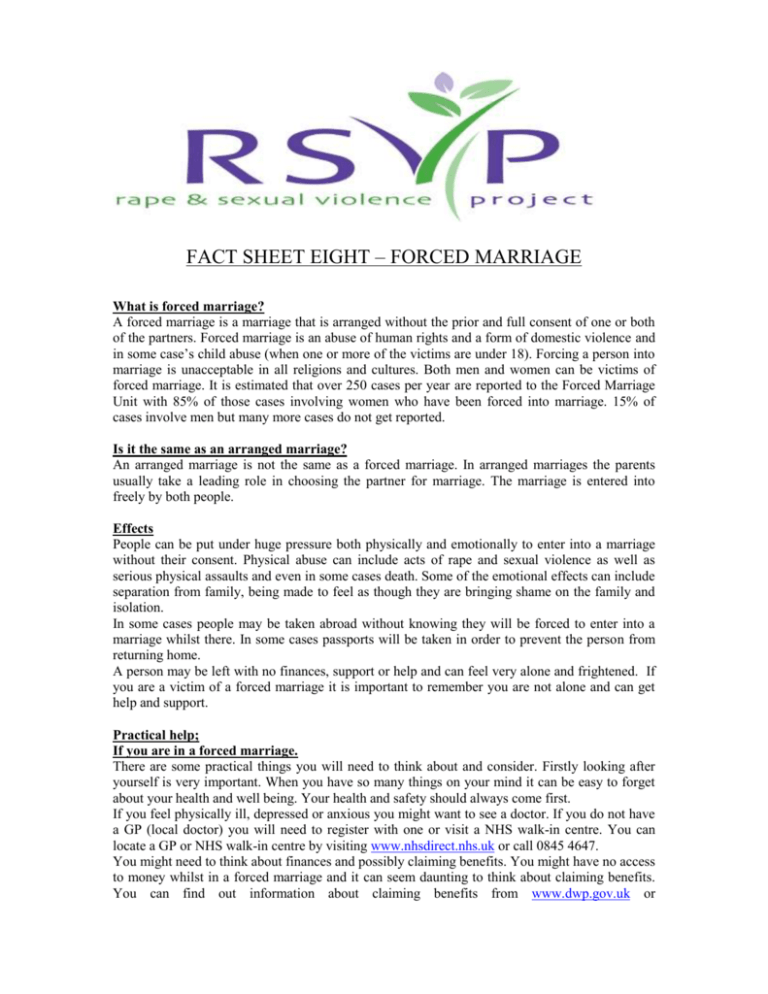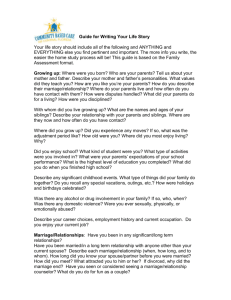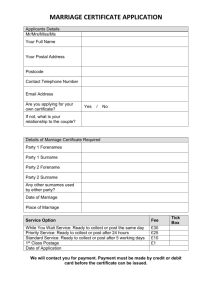
FACT SHEET EIGHT – FORCED MARRIAGE
What is forced marriage?
A forced marriage is a marriage that is arranged without the prior and full consent of one or both
of the partners. Forced marriage is an abuse of human rights and a form of domestic violence and
in some case’s child abuse (when one or more of the victims are under 18). Forcing a person into
marriage is unacceptable in all religions and cultures. Both men and women can be victims of
forced marriage. It is estimated that over 250 cases per year are reported to the Forced Marriage
Unit with 85% of those cases involving women who have been forced into marriage. 15% of
cases involve men but many more cases do not get reported.
Is it the same as an arranged marriage?
An arranged marriage is not the same as a forced marriage. In arranged marriages the parents
usually take a leading role in choosing the partner for marriage. The marriage is entered into
freely by both people.
Effects
People can be put under huge pressure both physically and emotionally to enter into a marriage
without their consent. Physical abuse can include acts of rape and sexual violence as well as
serious physical assaults and even in some cases death. Some of the emotional effects can include
separation from family, being made to feel as though they are bringing shame on the family and
isolation.
In some cases people may be taken abroad without knowing they will be forced to enter into a
marriage whilst there. In some cases passports will be taken in order to prevent the person from
returning home.
A person may be left with no finances, support or help and can feel very alone and frightened. If
you are a victim of a forced marriage it is important to remember you are not alone and can get
help and support.
Practical help;
If you are in a forced marriage.
There are some practical things you will need to think about and consider. Firstly looking after
yourself is very important. When you have so many things on your mind it can be easy to forget
about your health and well being. Your health and safety should always come first.
If you feel physically ill, depressed or anxious you might want to see a doctor. If you do not have
a GP (local doctor) you will need to register with one or visit a NHS walk-in centre. You can
locate a GP or NHS walk-in centre by visiting www.nhsdirect.nhs.uk or call 0845 4647.
You might need to think about finances and possibly claiming benefits. You might have no access
to money whilst in a forced marriage and it can seem daunting to think about claiming benefits.
You can find out information about claiming benefits from www.dwp.gov.uk or
www.adviceguide.org.uk. Your local Citizens Advise Bureau will also be able to give you advice
on benefits and managing your money.
A priority for you will be to find a new place to live. You might not be able to return to your
family through fear of physical, emotional or sexual violence. It is there fore essential that you
find a safe place such as a refuge. A refuge is a house for women and children where only the
residents know the address, making it a safe place to stay. Some women may stay in a refuge
short term, others for longer depending on your circumstances. Refuges aren’t open to men but
both men and women can call Shelters free 24-hour housing advice line on 0808 8004444 for
help. For more information you can contact www.refuge.org.uk or www.shelter.org.uk.
What services can RSVP offer?
RSVP has many years of experience working with survivors of sexual violence and abuse. We
provide a confidential service to suit individuals’ needs. We offer a variety of support services to
men and women, including:
- A telephone helpline, providing information, signposting and a listening ear
- One-to-one counselling
- Advocacy, supporting people who want to report the crime to the Police.
We can sometimes provide these services in other Community languages.
Other Sources of help
The Doli Project – Based in Hockley, Birmingham, Doli staff offer a culturally and linguistically
sensitive service to individual or families. Tel: 0845 658 1057 or email:
doli@c-b-p.org
Hamara – Based in Birmingham, Hamara offers counselling and support for young Asian women
and girls aged 11 – 25 and is led by an all Asian female team. Tel 0121 544 1711
NIA Ashram – Based in Birmingham, NIA Ashram can offer confidential housing/refuge advice
to women as well as mental health and domestic abuse counselling. Tel 0121 764 3817
The Forced Marriage Unit – A national service offering confidential support and information to
both men and women. Tel: 020 7008 0151 or out of hours emergency tel: 020 7008 1500 or
email: fmu@fco.gov.uk
Recommended reading
Jack and Zena: A True Story Of Love And Danger – by John McCarthy, Jack Briggs and Zena
Briggs (2000, Victor Gollancz)
Shame – by Jasvinder Sanghera (2007, Hodder and Stoughton Ltd)
Burned Alive – by Souad (2005, Bantam)
In The Name Of Honour – by Mokhtar Mai (2007, Virago Press)
RSVP office: 0121 643 0301 Helpline: 0121 643 4136
Leaflets, handouts, exercises and posters
This factsheet may be photocopied under the following conditions:
1.
2.
3.
Each page must be copied in its entirety, including RSVP information headings, where applicable.
Copies may be made for use within organisations for training purposes or for clients/individuals for self help purposes.
Copies may not be resold.









